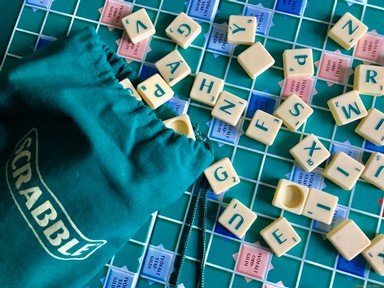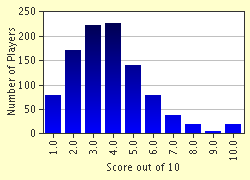Quiz Answer Key and Fun Facts
1. OPENING PLAY. It is your turn to start the game, and you have drawn the following seven letters- B E F I I R X. You decide to keep the attractive 'XI' combination and work with the other five letters. What would be the best opening play? I will give you the points score for each option, and will capitalise the letter that is on the centre (star) square.
2. HOOKING. A 'hook' is simply a letter placed before or after a word that is already on the board, which will create two words- one across and one down. An example is the word 'PEND'- a front hook could be U (Upend) or S (Spend). Some obscure front hooks are available among the 270,000+ words in the Scrabble players armoury. I have listed three of them here, but can you spot the word that is NOT a legitimate front hook?
3. In tournament play you have three options when it is your turn- playing a word, exchanging or passing.
Consider this scenario; your opponent has the first play, but elects to pass. You do not have a high scoring word on your rack. What should you do?
4. EXCHANGING. On occasions you will draw totally rubbishy letters like A-C-C-V-V-U-U, or A-A-A-A-O-O-V. Both of these racks contain legal words (VAC and OVA), but these do not score well, and will still leave you with bad letters. Assuming you have a reasonably open board, would it be wise to exchange ALL letters on both of these racks?
5. THE 'Q' TILE. No other single letter causes more consternation than the Q, however, since a whole raft of words now exist that do not require an accompanying U, it is not as fearful as most novices make it out to be. Which of these 'Q' words is NOT legal under SOWPODS rules?
6. Your opponent has played a word that you are not familiar with. At what stage of play do you announce that you are going to challenge the word?
7. FISHING-You get a bit lucky and early in the game draw a very nice rack of useful letters- A E I R S T U. You know that there are no 7-letter bingos because of the 'U'. What would be your best option in this situation?
8. Is it legal to keep a written record of all the tiles that have been played in a game?
9. END GAME. Many games are won or lost when there are only a handful of tiles left in the bag. It is your turn to play and you are leading by about 40 points. You and your opponent both have a full rack and there are only three letters left in the bag. Which of the following should you NOT do?
10. Statisticians, and others with way too much time on their hands, have determined that the most likely rack of unduplicated letters is 'A E I N O R T'. There is only one acceptable seven-letter word here, and it means 'relating to a sea-lion'. What is that word?
Source: Author
ozzz2002
This quiz was reviewed by FunTrivia editor
Bruyere before going online.
Any errors found in FunTrivia content are routinely corrected through our feedback system.

